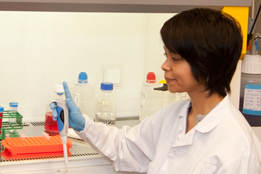Innate Immunity and sepsis

New treatment strategies have only modestly increased survival of in critically ill septic patients. We aim to improve our knowledge of the molecular mechanisms governing host-pathogen interactions and innate immunity to identify new therapeutic targets for the treatment of septic patients.
Main research topics
Innate immunity, infectious diseases and sepsis
The innate immune system represents the first line of defense against invading pathogens of all multicellular organisms. The recognition of pathogens by innate immune cells activates a series of intracellular events resulting in the initiation of an inflammatory response, which is essential to fight infection. The inflammatory response is characterized by the release of a broad spectrum of immuno-modulatory mediators such as cytokines that help to contain microbial invasion and to shape the adaptive immune response.
The regulation of innate immune responses is a delicate balancing act. Dysregulated innate immune reactions, either by default or by excess, have dramatic consequences for the infected host as observed in patients with severe sepsis. Furthermore, it is well established that genetic factors influence the development of inflammatory and innate immune responses to infectious agents.
Combining fundamental, genetic, pre-clinical and clinical approaches, our goals are to:
- Identify the innate immune pathways (Toll-like receptors, RIG-I-like receptors, NOD-like receptors and C-type lectins) activated by bacteria, fungi and viruses in innate immune cells (dendritic cells, monocytes/macrophages) and in vivo (preclinical mouse models).
- Characterize the role played by the cytokine macrophage migration inhibitory factor (MIF) in regulating inflammatory and innate immune responses.
- Identify factors influencing the susceptibility to or the severity of infectious diseases and sepsis (cohort studies).
- Characterize the factors conditioning the qualitative and quantitative deficiencies of the neonatal innate immune system and the high susceptible to severe bacterial infections of newborns.
- Develop new therapeutic options for the management of patients suffering from sepsis (i.e. antibodies or immuno-modulatory drugs that we test in vitro and in preclinical models of inflammation, infection and sepsis).
Our translational approach has the potential of identifying new treatment options for septic patients, thereby linking basic research to patient care. It also generates useful data for the improvement of our understanding of the pathogenesis of inflammatory diseases beyond sepsis. Our research team provides expertise in areas such as molecular and cell biology, experimental animal models, genetic epidemiology and biostatistics in a highly motivating university hospital environment.
Contacts
Lausanne University Hospital (CHUV)
CLED.04.407
Chemin des Boveresses 155
CH-1066 Epalinges
Switzerland



